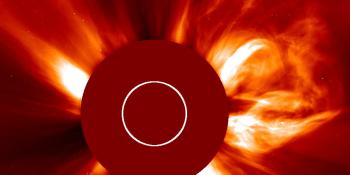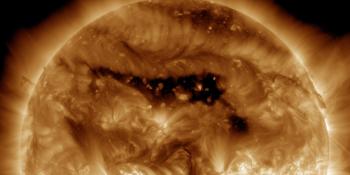Viewing archive of Thursday, 12 October 2000
Solar activity report
Any mentioned solar flare in this report has a scaling factor applied by the Space Weather Prediction Center (SWPC). Because of the SWPC scaling factor, solar flares are reported as 42% smaller than for the science quality data. The scaling factor has been removed from our archived solar flare data to reflect the true physical units.
Report of Solar-Geophysical Activity 2000 Oct 12 2200 UTCPrepared by the NOAA © SWPC and processed by SpaceWeatherLive.com
Joint USAF/NOAA Report of Solar and Geophysical Activity
SDF Number 286 Issued at 2200Z on 12 Oct 2000IA. Analysis of Solar Active Regions and Activity from 11-2100Z to 12-2100Z Solar activity increased to moderate levels. An M1
X-ray flare occurred at 12/2049 UTC and was in progress as the
period ended. The source of the flare appeared to be Region 9182
(N06W66). Activity was at low levels prior to this flare with
isolated, low-level C-class flares from Region 9182. Region 9182
continued to show a slight mixing of polarities in the vicinity of
its leader spots, but no further development was evident. Minor
growth was noted in Regions 9190 (S18E20) and 9192 (S13W12). Both
regions were small and simply structured. Four new regions were
numbered today: 9194 (S13E60), 9195 (N14W70), 9196 (S31W45), and
9197 (N26E70).
IB. Solar Activity Forecast
Solar activity is expected to be at
low to moderate levels. Region 9182 may produce additional isolated
M-class flares. Chances for M-class flare activity are expected to
increase beginning 14 October due to the return of old Region 9169
(N12, L = 080).
IIA. Geophysical Activity Summary 11-2100Z to 12-2100Z
Geomagnetic field activity was at quiet to unsettled levels.
IIB. Geophysical Activity Forecast
The CME from the long-duration
C6/1F flare of 09 October is now expected to arrive by early 13
October followed by active to major storm conditions. Activity is
expected to decline to unsettled to active levels on 14 October as
the CME effects subside. There will be a slight chance for high flux
levels at greater than 2 MeV late in the period.
III. Event Probabilities 13 Oct to 15 Oct
| Class M | 30% | 40% | 40% |
| Class X | 05% | 05% | 05% |
| Proton | 05% | 05% | 05% |
| PCAF | green | ||
IV. Penticton 10.7 cm Flux
Observed 12 Oct 163 Predicted 13 Oct-15 Oct 170/180/195 90 Day Mean 12 Oct 178
V. Geomagnetic A Indices
Observed Afr/Ap 11 Oct 013/014 Estimated Afr/Ap 12 Oct 008/011 Predicted Afr/Ap 13 Oct-15 Oct 035/035-015/015-012/012
VI. Geomagnetic Activity Probabilities 13 Oct to 15 Oct
| A. Middle Latitudes | |||
|---|---|---|---|
| Active | 20% | 25% | 25% |
| Minor storm | 40% | 10% | 10% |
| Major-severe storm | 20% | 01% | 01% |
| B. High Latitudes | |||
|---|---|---|---|
| Active | 20% | 30% | 30% |
| Minor storm | 40% | 15% | 15% |
| Major-severe storm | 25% | 01% | 01% |
All times in UTC
Latest news
Latest forum messages
jsoc 64Strong far side CME 321Unspecified geomagnetic activity 1746Power transmission for all of us. And why I believe we are better prepared than ever for major solar events 6AR 13932 10
More topicsSupport SpaceWeatherLive.com!
A lot of people come to SpaceWeatherLive to follow the Sun's activity or if there is aurora to be seen, but with more traffic comes higher server costs. Consider a donation if you enjoy SpaceWeatherLive so we can keep the website online!

Space weather facts
| Last X-flare | 2024/12/08 | X2.2 |
| Last M-flare | 2024/12/22 | M1.0 |
| Last geomagnetic storm | 2024/12/17 | Kp5+ (G1) |
| Spotless days | |
|---|---|
| Last spotless day | 2022/06/08 |
| Monthly mean Sunspot Number | |
|---|---|
| November 2024 | 152.5 -13.9 |
| December 2024 | 103.3 -49.2 |
| Last 30 days | 115.4 -40.8 |


